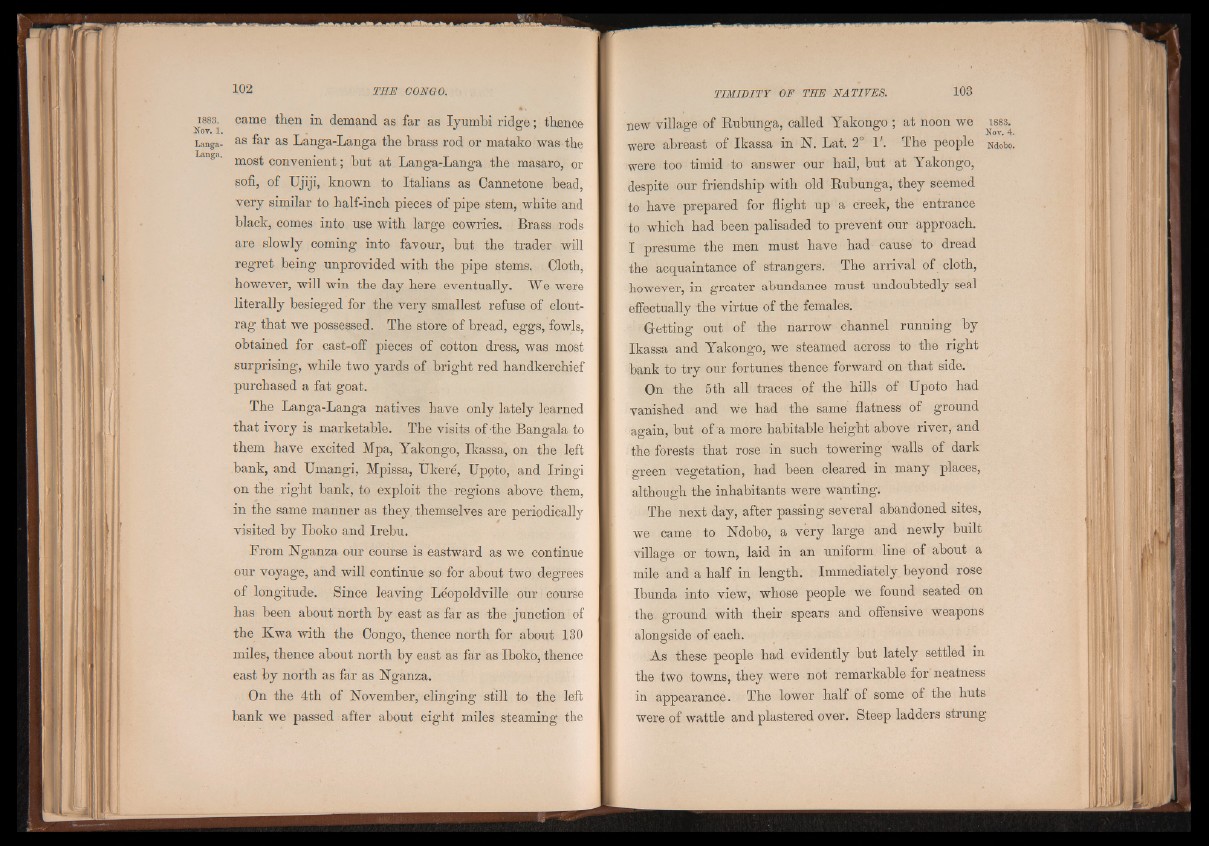
1883.
Noy. 1.
Langa-
Langa.
came then in demand as far as Iyumbi ridge; thence
as far as Langa-Langa the brass rod or matako was the
most convenient; hut at Langa-Langa the masaro, or
sofi, of TJjiji, known to Italians as Cannetone head,
very similar to half-inch pieces of pipe stem, white and
black, comes into use with large cowries. Brass rods
are slowly coming into favour, but the trader will
regret being unprovided with the pipe stems. Cloth,
however, will win the day here eventually. We were
literally besieged for the very smallest refuse of clout-
rag that we possessed. The store of bread, eggs, fowls,
obtained for cast-off pieces of cotton dress, was most
surprising, while two yards of bright red handkerchief
purchased a fat goat.
The Langa-Langa natives have only lately learned
that ivory is marketable. The visits of the Bangala to
them have excited Mpa, Yakongo, Ikassa, on the left
bank, and Umangi, Mpissa, Ukere, Upoto, and Iringi
on the right bank, to exploit the regions above them,
in the same manner as they, themselves are periodically
visited by Iboko and Irebu.
From Nganza our course is eastward as we continue
our voyage, and will continue so for about two degrees
of longitude. Since leaving Leopoldville our ■ course
has been about north by east as far as the junction of
the Kwa with the Congo, thence north for about 130
miles, thence about north by east as far as Iboko, thence
east by north as far as Nganza.
On the 4th of November, clinging still to the left
bank we passed after about eight miles steaming the
new village of Rubunga, called Yakongo ; at noon we 1883.
° Nov. 4
were abreast of Ikassa in N. Lat. 2° 1'. The people Ndot>Q
were too timid to answer our hail, but at Yakongo,
despite our friendship with old Rubunga, they seemed
to have prepared for flight up a creek, the entrance
to which had been palisaded to prevent our approach.
I presume the men must have had cause to dread
the acquaintance of strangers. The arrival of cloth,
however, in greater abundance must undoubtedly seal
effectually the virtue of the females.
Getting out of the narrow channel running by
Ikassa and Yakongo, we steamed across to the right
bank to try our fortunes thence forward on that side.
On the 5th all traces of the hills of Upoto had
vanished and we had the same flatness of ground
again, but of a more habitable height above river, and
the forests that rose in such towering walls of dark
green vegetation, had been cleared in many places,
although the inhabitants were wanting.
The next day, after passing several abandoned sites,
we came to Ndobo, a very large and newly built
village or town, laid in an uniform line of about a
mile and a half in length. Immediately beyond rose
Ibunda into view, whose people we found seated on
the ground with their spears and offensive weapons
alongside of each.
As these people had evidently but lately settled in
the two towns, they were not remarkable for neatness
in appearance. The lower half of some of the huts
were of wattle and plastered over. Steep ladders strung